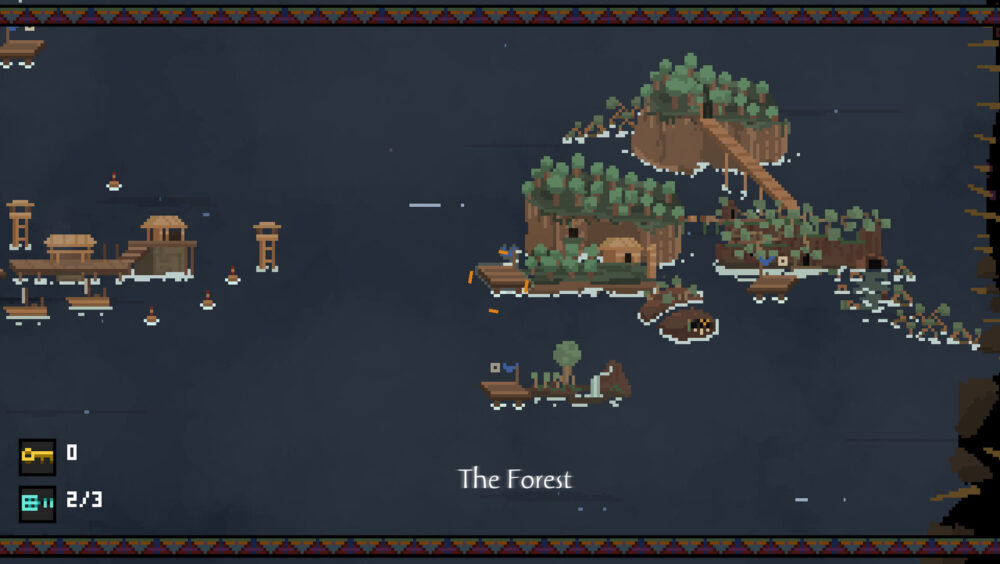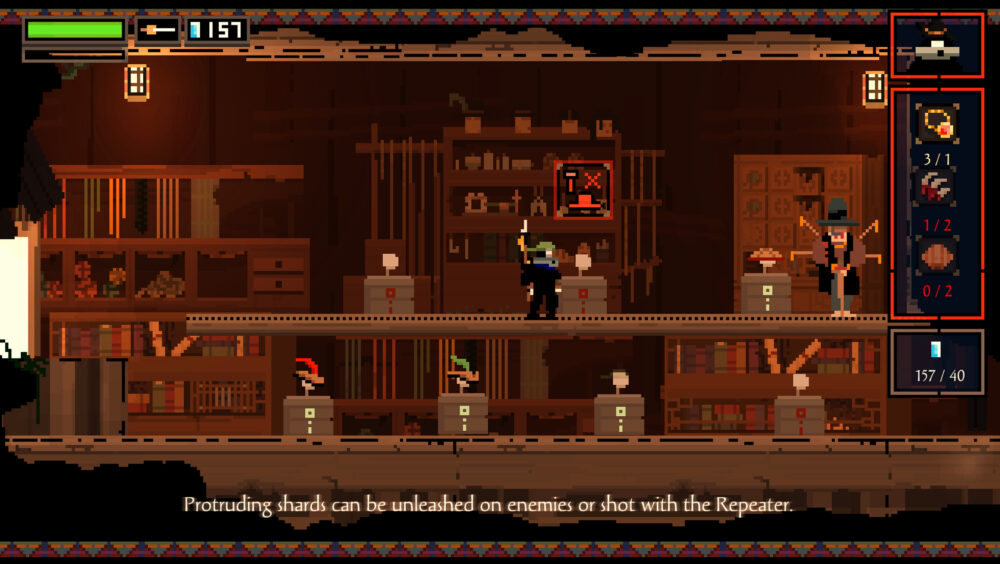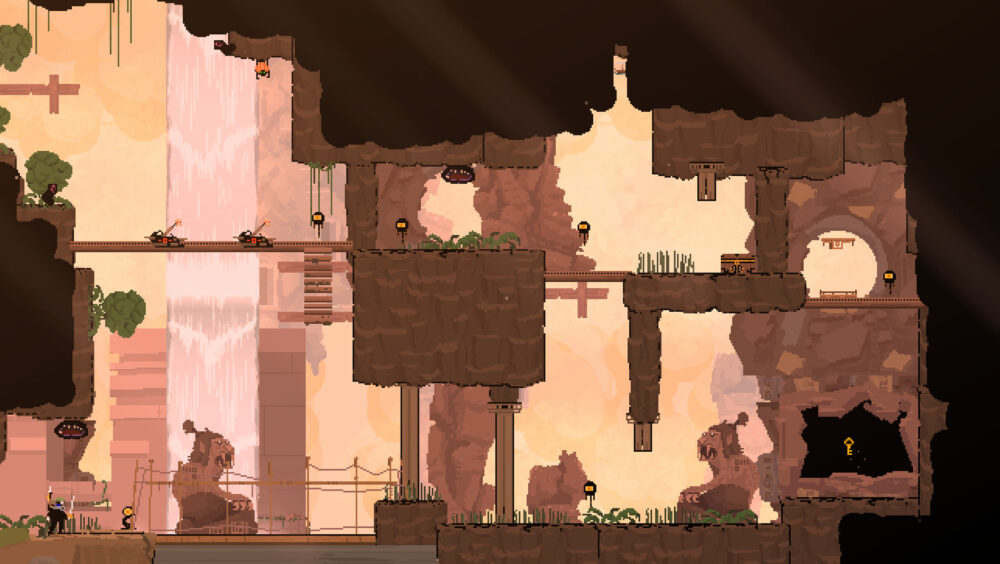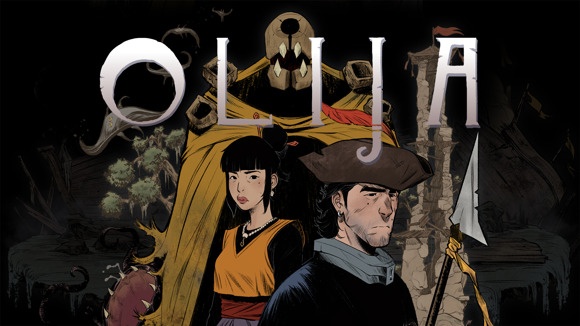Olija – pronounced “o-li-yah” if you are wondering what the hell that sound is when you load into the game – is a fantastic indie action-platformer that has a strong focus on the narrative and atmosphere, while still providing a satisfying blend of 2D traversal, combat, and puzzling. You take control of Lord Faraday, a noble whose seaside village has fallen on hard times. He sets sail with a small crew towards a group of Asian-inspired islands, known as “Terraphage”, believed to hold treasures that could restore his kingdom. Unsurprisingly, events do not go to plan when a storm destroys his vessel, and a mysterious boatman ferries him to an island of fellow shipwrecked outcasts.
This kicks off a short but epic adventure that has the player explore the surrounding islands for a means to escape the Terraphage archipelago through the massive “Shadow Gate”. Faraday must defeat several bosses and collect the required keys, start a fledgeling romance with the enigmatic princess of the ruined kingdom, and ultimately thwart a monstrous presence that suggests the unfolding events are all part of a prophecy. Apart from the ongoing narration and dialogue provided by the boatman, Olija features the bare minimum of direct storytelling, relying instead on background details, animated interactions, and brief cutscenes.

Despite the visual style limiting fine details, a combination of animation work, colour use, and soundtrack make for some impressive sequences
When it comes to gameplay, Olija is a typical 2D action-platformer that, mercifully, features no rogue-like elements so common in the genre these days – die and you are back to the last checkpoint, with your gear and consumables intact, and your progress never halted for long. You will move from screen to screen, jumping, grappling, dodging, slashing, and shooting your way through caves, temples, forests, and other ruins.
The balance of traversal, combat, puzzles, and narrative sequences is one of Olija’s strong points. The action moves at a brisk pace, and it is rare that you will traverse more than a handful of screens defeating foes, before being presented with a puzzle sequence, a challenging boss encounter, or a beautifully animated interaction with the princess Olija and her retinue. Each island cluster you visit offers up new scenery and tougher enemies while defeating the boss will provide a short cutscene that fleshes out the story and directs you to another part of the archipelago.

You travel to each island cluster sequentially, but each location contains several objectives you can tackle in any order.
Olija introduces the player to a magical harpoon early on, which is used for combat, traversal, and several puzzles. You can fling it at enemies; recall it to your hands (potentially drawing it back through enemies for a second strike); latch on to enemies or grapple points and hurtle towards them, or simply trigger switches from afar. This basic attack is supplemented by a handful of melee and ranged secondary weapons and, once you get the hang of quickly dashing in and away from targets, even boss fights against multiple tough foes (or those with multiple limbs) go from chaotic brawls to skilful performances. That said, battles against numerous foes or those that share your ability to dash around the screen can be difficult to follow.
As you tear through enemies and destructible objects (think supply crates, fauna, and foliage), you will accumulate currency and crafting materials. Currency gives you the ability to add new facilities to your outpost, upgrade your health pool at an alchemist, or send out expeditions for random crafting rewards. Both currency and crafting materials are used for crafting magic hats, which grant unique buffs to your attacks that can alter how you play and influence your choice of secondary weapons. Once a combo meter is filled, you can unleash devastating area-of-effect attacks, add explosive shrapnel to your rifle shots, or charge your harpoon with electricity to name a few. My personal favourite, and one that got me out of trouble numerous times, was a hat that granted a life steal – perfect when used in combination with the rapier, which quickly builds up the combo meter in a flurry of strikes.

Upgrading your outpost and crafting new magical hats makes it worth returning after every mission (as those upgrades will usually make subsequent missions easier).
Thanks to short levels and a frequent change of scenery, no gameplay element overstayed its welcome. That said, for those looking to increase their playtime, Olija’s environments are full of secrets to discover. These including messages in bottles, music boxes, and, most importantly, captured outcasts that will join your fledgeling outpost when rescued. However, even these collectables are typically placed just off the main path or in a region you will retread for story purposes, minimizing backtracking when you have unlocked new skills. It keeps the game moving at a brisk pace and the player rarely experiences any significant downtime between story beats.
From a distance, Olija can look rough in screenshots, however, the retro art style – think late Atari consoles or the 8-bit NES – is used to great effect, thanks to beautiful animation work, the use of vibrant and contrasting colours, and the soundtrack (which alternates between high-tempo Flamenco and calming Japanese tracks). Olija is a game in which the impact of the presentation relies on the sum of all parts, rather than one standout element. Even the mumbling, indecipherable voices that accompany the text match the intonation of each sentence. It all goes a long way to portraying Olija as an epic adventure, despite its short run time and limited gameplay systems compared to some of its peers.

Olija is always at its best when it blends traversal, combat, and puzzling in one location.
In summary, Olija is exactly what I’m looking for in indie games, a short but entertaining experience that hits all the high notes of typical “AAA” titles but shows respect for my time. There is a strong focus on the narrative and atmospheric presentation, yet the movement and combat systems are designed to encourage mastery. If you are a fan of stylish action-platformers, consider Olija is a must-play.
This review is based on the Xbox version of the game which can be purchased here for $14.99
Not got an Xbox no worries the game is also available on PC, Nintendo Switch and PlayStation
Olija was Published by Devolver Digital and Developed by Skeleton Crew Studio and Thomas Olsson.
Enjoy the review? want to read more of our reviews? then click right here to be whisked away to the realm of our opinions.








You must be logged in to post a comment.